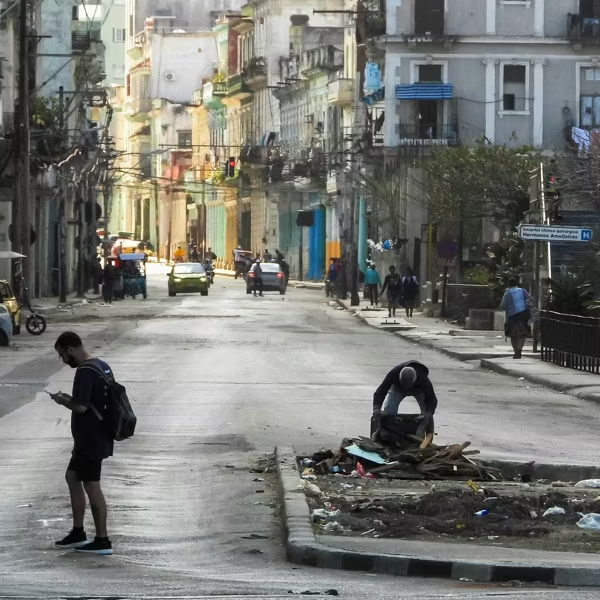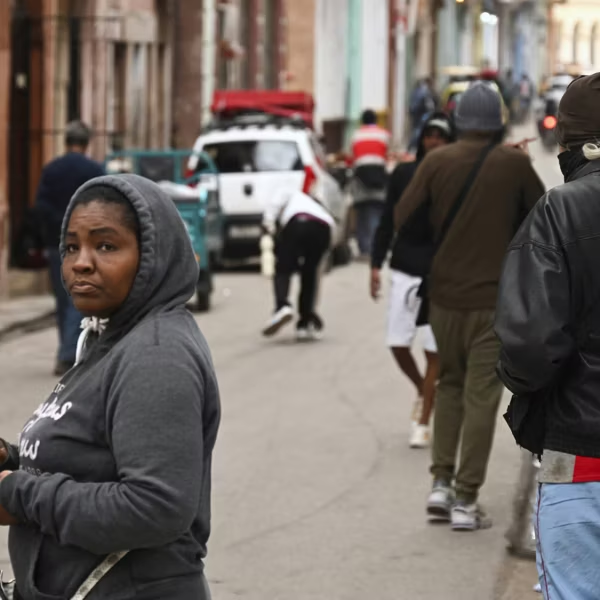Castro Demands Obama Drop Blockade, Return 'Illegally Occupied' Guantanamo
Fifty-five percent of Americans said they support ending the 54-year-old trade embargo
During the first family's historic visit to Cuba on Monday, the Cuban president confronted President Barack Obama about the crippling trade embargo and called on him to "return the territory illegally occupied by Guantanamo Base."
At an afternoon press conference in Havana, the two leaders touted the "concrete" achievements made since the countries resumed diplomatic relations in December 2014.
"In the 15 months that have passed since the decision was made to establish diplomatic relations, we have achieved concrete results," declared President Raul Castro. These include resuming direct postal exchanges, and signing agreements to resume commercial flights, govern maritime environments, and pending deals regarding agriculture, drug trafficking, medicine, and other "commercial operations," such as telecommunications.
However, Castro added, "Much more could be done if the U.S. blockade were lifted."
Fifty-five percent of Americans said they support ending the 54-year-old trade embargo, according to a CBS News/New York Times poll released on Monday. A full 58 percent support the normalization of diplomatic ties between the two countries.
Castro acknowledged that Obama's "repeated appeals to Congress to have [the blockade] removed" have been ignored. But, Castro said, the measures adopted thus far "are positive but insufficient" and volunteered "other steps that could be taken to remove restrictions that remain in force and make a significant effect in the reduction of the blockade."
"The blockade remains in force and it contains discouraging elements and intimidating effects and [is guilty of] extraterritorial outreach," Castro stated.
In response, Obama again put the onus on Congress to repeal the embargo, adding, "Frankly Congress is not as active as I would like during presidential election years."
The Cuban leader also said that in order to truly normalize relations, the U.S. must "return the territory illegally occupied by Guantanamo Base," a demand which the Obama administration has thus far refused.
Secretary of State John Kerry said during a recent hearing that "there's no plan, no discussion" about returning the offshore naval base and prison, adding that he would "personally be opposed to that."
Castro, who has been under fire for reported human rights abuses including crackdowns on political dissidents, took a swipe at the United States' own record when it comes to prisoner abuse and issues of social and economic justice.
"There are profound differences between our countries that will not go away, since we hold different ideas on many subjects, such as political systems, democracy, the exercise of human rights, social justice, international relations, and world peace and stability," Castro said. "We defend human rights. We consider that the civil, political, economic and cultural rights are indivisible, interdependent and universal."
The communist leader said that Cubans "find it inconceivable that a government does not ensure the right to healthcare, education, social security, food, and development, equal pay, and the rights of children."
Further, he said that Cubans "oppose political manipulation and double standards in the approach to civil rights," a comment which the Guardian said "could easily be read as a criticism of U.S. actions in Guantanamo versus its rhetoric on human rights."
An Urgent Message From Our Co-Founder
Dear Common Dreams reader, The U.S. is on a fast track to authoritarianism like nothing I've ever seen. Meanwhile, corporate news outlets are utterly capitulating to Trump, twisting their coverage to avoid drawing his ire while lining up to stuff cash in his pockets. That's why I believe that Common Dreams is doing the best and most consequential reporting that we've ever done. Our small but mighty team is a progressive reporting powerhouse, covering the news every day that the corporate media never will. Our mission has always been simple: To inform. To inspire. And to ignite change for the common good. Now here's the key piece that I want all our readers to understand: None of this would be possible without your financial support. That's not just some fundraising cliche. It's the absolute and literal truth. We don't accept corporate advertising and never will. We don't have a paywall because we don't think people should be blocked from critical news based on their ability to pay. Everything we do is funded by the donations of readers like you. Will you donate now to help power the nonprofit, independent reporting of Common Dreams? Thank you for being a vital member of our community. Together, we can keep independent journalism alive when it’s needed most. - Craig Brown, Co-founder |
During the first family's historic visit to Cuba on Monday, the Cuban president confronted President Barack Obama about the crippling trade embargo and called on him to "return the territory illegally occupied by Guantanamo Base."
At an afternoon press conference in Havana, the two leaders touted the "concrete" achievements made since the countries resumed diplomatic relations in December 2014.
"In the 15 months that have passed since the decision was made to establish diplomatic relations, we have achieved concrete results," declared President Raul Castro. These include resuming direct postal exchanges, and signing agreements to resume commercial flights, govern maritime environments, and pending deals regarding agriculture, drug trafficking, medicine, and other "commercial operations," such as telecommunications.
However, Castro added, "Much more could be done if the U.S. blockade were lifted."
Fifty-five percent of Americans said they support ending the 54-year-old trade embargo, according to a CBS News/New York Times poll released on Monday. A full 58 percent support the normalization of diplomatic ties between the two countries.
Castro acknowledged that Obama's "repeated appeals to Congress to have [the blockade] removed" have been ignored. But, Castro said, the measures adopted thus far "are positive but insufficient" and volunteered "other steps that could be taken to remove restrictions that remain in force and make a significant effect in the reduction of the blockade."
"The blockade remains in force and it contains discouraging elements and intimidating effects and [is guilty of] extraterritorial outreach," Castro stated.
In response, Obama again put the onus on Congress to repeal the embargo, adding, "Frankly Congress is not as active as I would like during presidential election years."
The Cuban leader also said that in order to truly normalize relations, the U.S. must "return the territory illegally occupied by Guantanamo Base," a demand which the Obama administration has thus far refused.
Secretary of State John Kerry said during a recent hearing that "there's no plan, no discussion" about returning the offshore naval base and prison, adding that he would "personally be opposed to that."
Castro, who has been under fire for reported human rights abuses including crackdowns on political dissidents, took a swipe at the United States' own record when it comes to prisoner abuse and issues of social and economic justice.
"There are profound differences between our countries that will not go away, since we hold different ideas on many subjects, such as political systems, democracy, the exercise of human rights, social justice, international relations, and world peace and stability," Castro said. "We defend human rights. We consider that the civil, political, economic and cultural rights are indivisible, interdependent and universal."
The communist leader said that Cubans "find it inconceivable that a government does not ensure the right to healthcare, education, social security, food, and development, equal pay, and the rights of children."
Further, he said that Cubans "oppose political manipulation and double standards in the approach to civil rights," a comment which the Guardian said "could easily be read as a criticism of U.S. actions in Guantanamo versus its rhetoric on human rights."
During the first family's historic visit to Cuba on Monday, the Cuban president confronted President Barack Obama about the crippling trade embargo and called on him to "return the territory illegally occupied by Guantanamo Base."
At an afternoon press conference in Havana, the two leaders touted the "concrete" achievements made since the countries resumed diplomatic relations in December 2014.
"In the 15 months that have passed since the decision was made to establish diplomatic relations, we have achieved concrete results," declared President Raul Castro. These include resuming direct postal exchanges, and signing agreements to resume commercial flights, govern maritime environments, and pending deals regarding agriculture, drug trafficking, medicine, and other "commercial operations," such as telecommunications.
However, Castro added, "Much more could be done if the U.S. blockade were lifted."
Fifty-five percent of Americans said they support ending the 54-year-old trade embargo, according to a CBS News/New York Times poll released on Monday. A full 58 percent support the normalization of diplomatic ties between the two countries.
Castro acknowledged that Obama's "repeated appeals to Congress to have [the blockade] removed" have been ignored. But, Castro said, the measures adopted thus far "are positive but insufficient" and volunteered "other steps that could be taken to remove restrictions that remain in force and make a significant effect in the reduction of the blockade."
"The blockade remains in force and it contains discouraging elements and intimidating effects and [is guilty of] extraterritorial outreach," Castro stated.
In response, Obama again put the onus on Congress to repeal the embargo, adding, "Frankly Congress is not as active as I would like during presidential election years."
The Cuban leader also said that in order to truly normalize relations, the U.S. must "return the territory illegally occupied by Guantanamo Base," a demand which the Obama administration has thus far refused.
Secretary of State John Kerry said during a recent hearing that "there's no plan, no discussion" about returning the offshore naval base and prison, adding that he would "personally be opposed to that."
Castro, who has been under fire for reported human rights abuses including crackdowns on political dissidents, took a swipe at the United States' own record when it comes to prisoner abuse and issues of social and economic justice.
"There are profound differences between our countries that will not go away, since we hold different ideas on many subjects, such as political systems, democracy, the exercise of human rights, social justice, international relations, and world peace and stability," Castro said. "We defend human rights. We consider that the civil, political, economic and cultural rights are indivisible, interdependent and universal."
The communist leader said that Cubans "find it inconceivable that a government does not ensure the right to healthcare, education, social security, food, and development, equal pay, and the rights of children."
Further, he said that Cubans "oppose political manipulation and double standards in the approach to civil rights," a comment which the Guardian said "could easily be read as a criticism of U.S. actions in Guantanamo versus its rhetoric on human rights."

